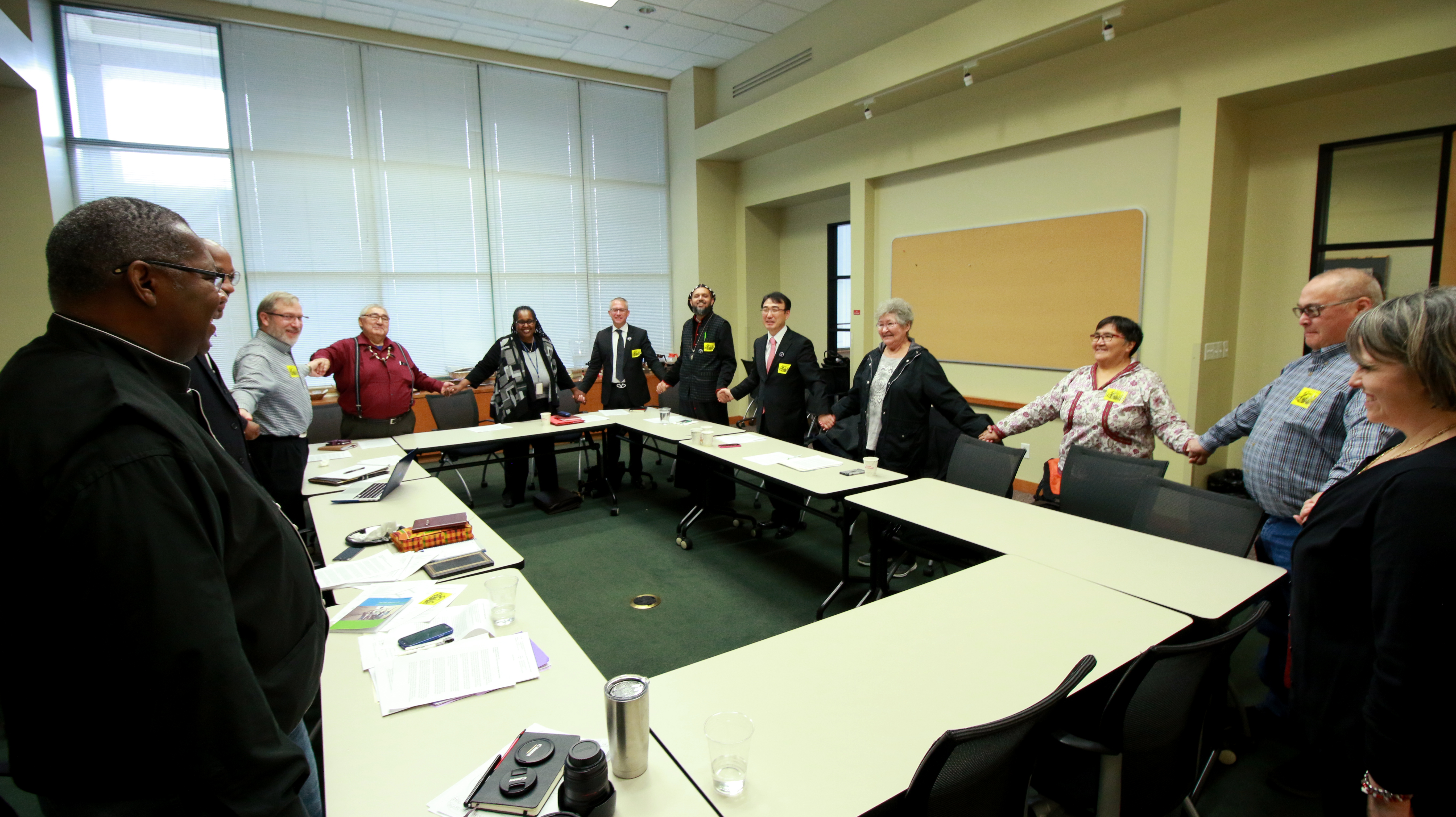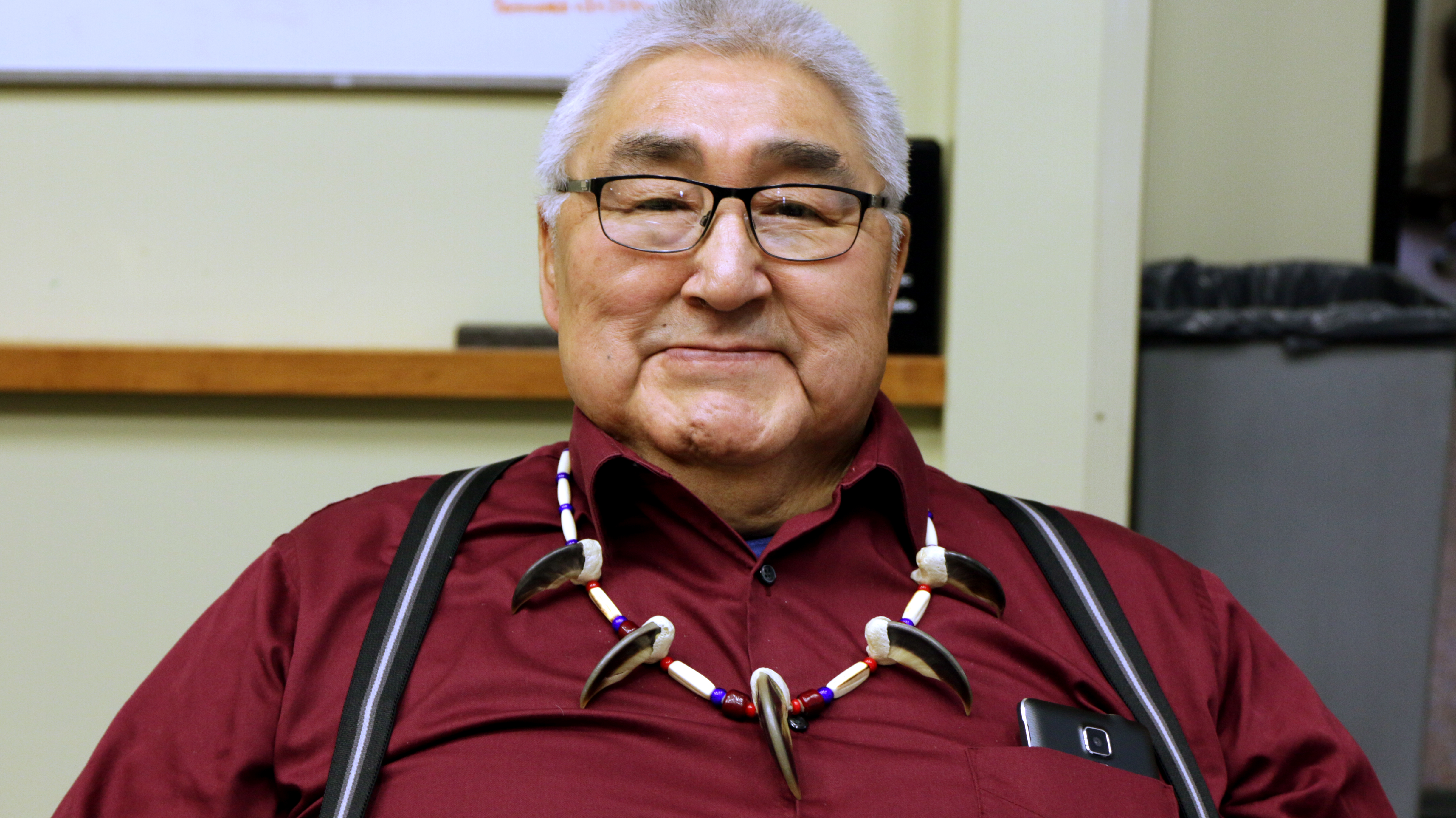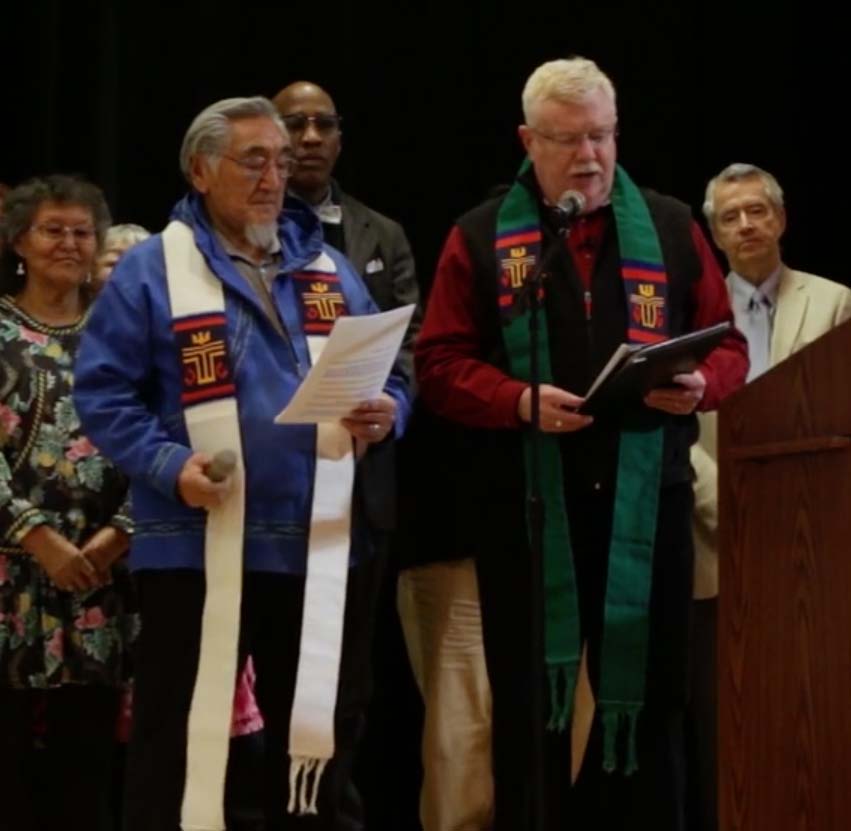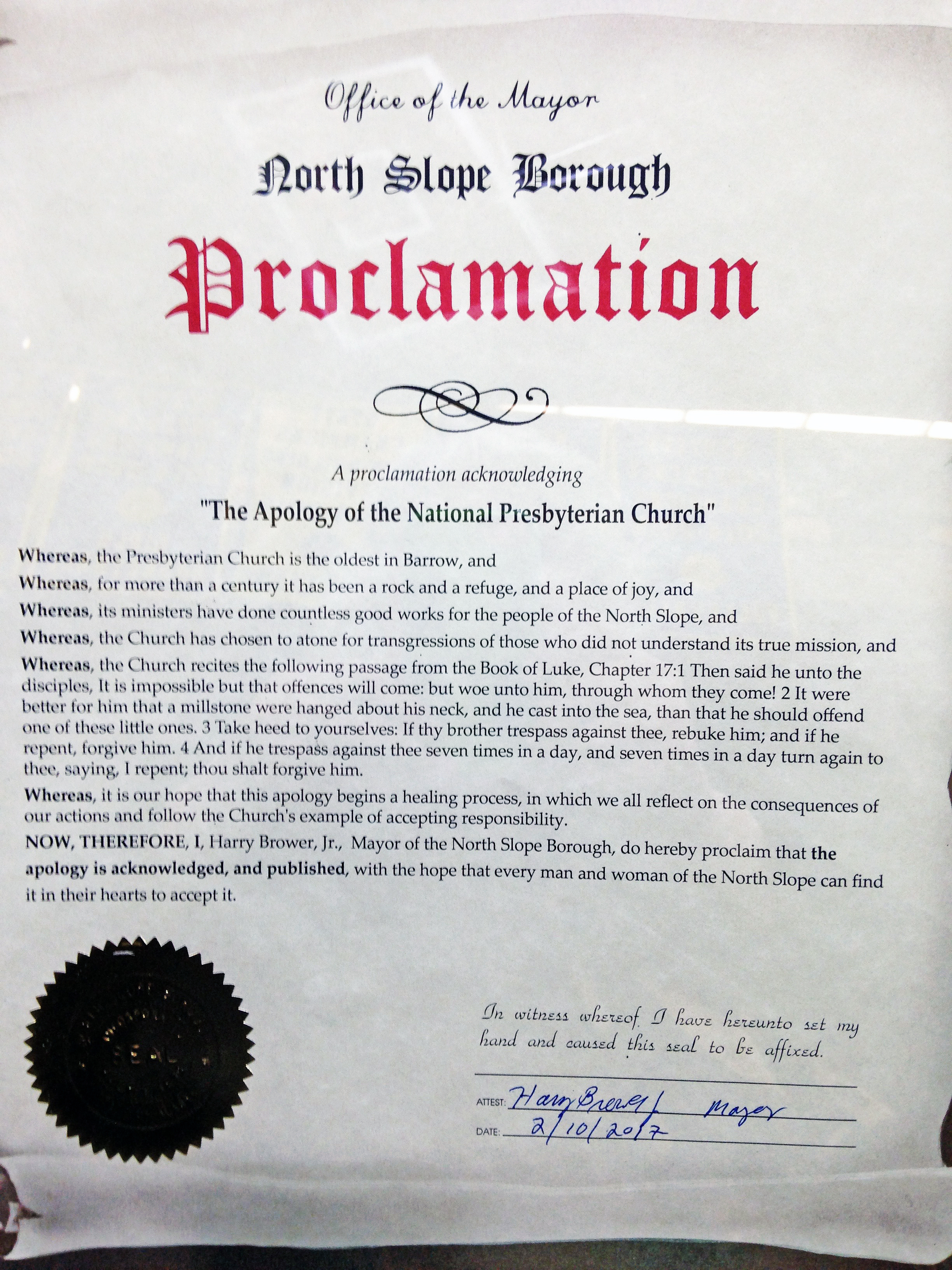Utqiagvik Apology & Healing Event
On February 6th-8th, 2017 the Presbytery of Yukon, along with the Utqiagvik Presbyterian Church, hosted a Renewal and Healing Event in Utqiagvik (formerly Barrow). The event culminated with a presentation of the PC(USA) Apology to Native American, Alaska Natives and Native Hawaiians on Thursday, February 9th, the first day of Kivgiq (The Messenger Feast).
PC(USA) Apology to Native Alaskans - Offered by Gradye Parsons, James Nageak Translator
GA Approved PC(USA) Apology to Native Americans, Alaska Native and Native Hawaiins
PCUSA Stated Clerk J. Herbert Nelson II, and retired PCUSA Stated Clerk Gradye Parsons, presented an apology for the ways the church often colluded in the damaging acts that brought about the historical trauma which has its roots in the Doctrine of Discovery. The Doctrine of Discovery was a deeply flawed ethical statement given by 16th Century Christians to justify colonialism and its oppression of non-Christian people. The doctrine caused Christian governments to falsely justify their actions in taking land from non-Christian people and claiming it as their own. According to this doctrine, the indigenous residents were to be treated however the government deemed necessary to keep the land and its resources, which included killing them, enslaving them, and eliminating their languages or cultures.

Unfortunately, the Doctrine of Discovery became a part of law in the U.S.A. through a Supreme Court case in 1823, and has continued to set legal precedent to the present day. Because Alaska became a part of the United States at a later date than most parts of the country, our history is somewhat different than that of other regions. It is also true that the history of the church in the Presbytery of Yukon is different than in Southeast Alaska.
Indeed, early missionaries are remembered with great respect in our presbytery. Horatio Marsh, Samuel Spence, and Henry Greist learned the Inupiaq language and helped translate hymns and raise up indigenous leaders. Marsh and Greist were medical doctors, as was John Gambell on St. Lawrence Island. Their medical help was indispensable in showing care and providing help when western disease inevitably moved into the region, and the gospel they proclaimed was, by all accounts, received with joy.
Still, the spiritual blindness embodied in the Doctrine of Discovery has shaped the way most Anglo-Americans have thought and acted toward people of other cultures and ethnic backgrounds throughout our history.
In Alaska, Presbyterians who sought to do good still participated in shaping policies across the state and taking actions that showed the racist and paternalistic attitudes of the majority culture. Cultural practices like drumming and dancing were deemed "heathen" or "savage" and were forbidden; families were split as children were sent to boarding schools, where even the Alaska Native languages were sometimes considered too "heathen" to express Christian thought. In many ways the churches participated in the racist and paternalistic practices that characterized the culture of the day. Christians are called to repent and seek forgiveness when we become aware of our sin. In this case the apology is particularly important.

Download these additional documents on the history behind the apology:
- A Call to Prayer at a Time of Apology
- The History of Education in Alaska and An Apology from PCUSA

Notes from Executive Presbyter Rev. Curtis Karns on the Renewal & Healing Event:
The Utqiagvik Presbyterian Church closely followed the two overtures on this topic. Although, at their prompting, some of us presented the apology at AFN last October, the big event for our presbytery happened two weeks ago during Kivgiq week. The importance of this event should not be missed by anyone. It was important enough that the Arctic Slope Regional Corporation and the Ukpeagvik Inuit Corporation each gave us a grant of $10,000 to do this well. This grant allowed us to bring one person from each of our congregations to Utqiagvik for the event.
However, there are two outcomes that need to follow. Noting that an apology that is not followed by walking a new path is not true repentance, we need to be asking God what our next steps should be. Two areas clearly require action:
a. We need to develop healing ministries for the effects of intergenerational, historical trauma left behind by the clash of Western culture into indigenous cultures in Alaska.
b. We need to find appropriate ways to raise up local leaders in our villages and communities, and to provide quality mentoring and training for them.

Additional Links of Interest:
PC(USA) Apology to Native Alaskans - Offered by Gradye Parsons, James Nageak Translator
GA Approved PC(USA) Apology to Native Americans, Alaska Native and Native Hawaiins
PCUSA Stated Clerk J. Herbert Nelson II, and retired PCUSA Stated Clerk Gradye Parsons, presented an apology for the ways the church often colluded in the damaging acts that brought about the historical trauma which has its roots in the Doctrine of Discovery. The Doctrine of Discovery was a deeply flawed ethical statement given by 16th Century Christians to justify colonialism and its oppression of non-Christian people. The doctrine caused Christian governments to falsely justify their actions in taking land from non-Christian people and claiming it as their own. According to this doctrine, the indigenous residents were to be treated however the government deemed necessary to keep the land and its resources, which included killing them, enslaving them, and eliminating their languages or cultures.

Event Planning Meeting in Louisville
Indeed, early missionaries are remembered with great respect in our presbytery. Horatio Marsh, Samuel Spence, and Henry Greist learned the Inupiaq language and helped translate hymns and raise up indigenous leaders. Marsh and Greist were medical doctors, as was John Gambell on St. Lawrence Island. Their medical help was indispensable in showing care and providing help when western disease inevitably moved into the region, and the gospel they proclaimed was, by all accounts, received with joy.
Still, the spiritual blindness embodied in the Doctrine of Discovery has shaped the way most Anglo-Americans have thought and acted toward people of other cultures and ethnic backgrounds throughout our history.
In Alaska, Presbyterians who sought to do good still participated in shaping policies across the state and taking actions that showed the racist and paternalistic attitudes of the majority culture. Cultural practices like drumming and dancing were deemed "heathen" or "savage" and were forbidden; families were split as children were sent to boarding schools, where even the Alaska Native languages were sometimes considered too "heathen" to express Christian thought. In many ways the churches participated in the racist and paternalistic practices that characterized the culture of the day. Christians are called to repent and seek forgiveness when we become aware of our sin. In this case the apology is particularly important.

Download these additional documents on the history behind the apology:
- A Call to Prayer at a Time of Apology
- The History of Education in Alaska and An Apology from PCUSA

Former Stated Clerk, Rev. Gradye Parsons
Rev. James Nageak Translates into Inupiaq
Rev. James Nageak Translates into Inupiaq
The Utqiagvik Presbyterian Church closely followed the two overtures on this topic. Although, at their prompting, some of us presented the apology at AFN last October, the big event for our presbytery happened two weeks ago during Kivgiq week. The importance of this event should not be missed by anyone. It was important enough that the Arctic Slope Regional Corporation and the Ukpeagvik Inuit Corporation each gave us a grant of $10,000 to do this well. This grant allowed us to bring one person from each of our congregations to Utqiagvik for the event.
However, there are two outcomes that need to follow. Noting that an apology that is not followed by walking a new path is not true repentance, we need to be asking God what our next steps should be. Two areas clearly require action:
a. We need to develop healing ministries for the effects of intergenerational, historical trauma left behind by the clash of Western culture into indigenous cultures in Alaska.
b. We need to find appropriate ways to raise up local leaders in our villages and communities, and to provide quality mentoring and training for them.

- The Kivgiq Renewal and Healing Event 2017 Facebook page, set up by the Utqiagvik Presbyterian Church office staff. This page has many resources that you may wish to see:
https://www.facebook.com/KivgiqRenewalHealing/ - The apology given by Rev. Gradye Parsons in English, and translated by Rev. James Nageak into Inupiaq.
https://www.youtube.com/watch?time_continue=2&v=tshc5mwli6o - The news release from the PC(USA) on the apology that included the full apology. Randy Hobson, who was in Utqiagvik from the PC(USA) Office of Communications did a great job putting this together. We will show it as part of the report at the Stated Meeting of Presbytery on Saturday.
http://www.pcusa.org/news/2017/2/9/pcusa-leaders-issue-apology-native-americans-alask/ - PC(USA) Stated Clerk, the Rev. Dr. J. Herbert Nelson's very hope-filled statement given as a further response to the apology to the Inupiaq people gathered on the first day of Kivgiq:
https://www.youtube.com/watch?v=smPLz60pkJw&feature=share

